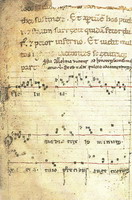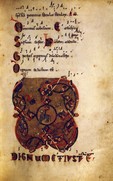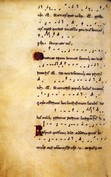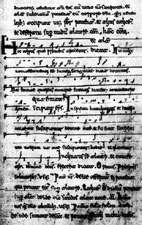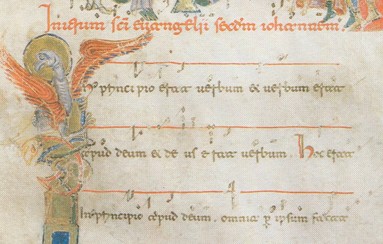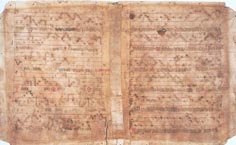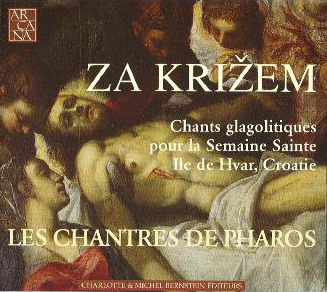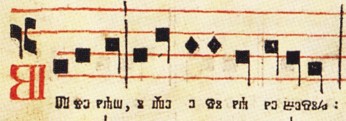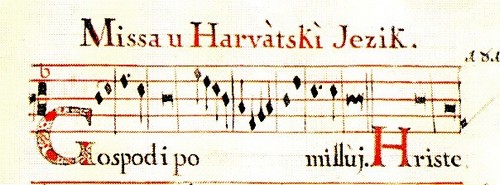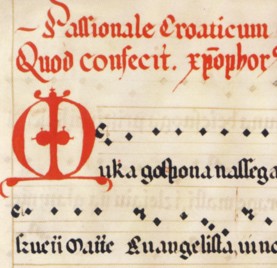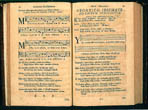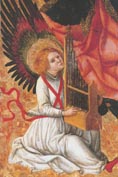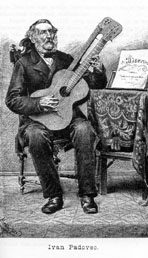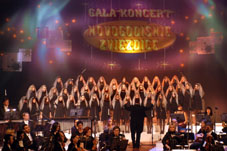Croatian Classical Music
Darko Zubrinic, Zagreb (1995) An age
is known by its music
Croatian proverb (see [Kuhac])
 The first Croatian neum manuscripts
for church music date from the 11th century. The Osor Evangelistary
(1080-1082) from the convent of st. Nikola in Osor (island of Cres) is
written in beneventana, ornamented by Monte Cassino initials, and accompanied
with old neums. This evangelistary contains among others a prayer for
the Pope, for Byzantine tsar, and for the King which at that time was
factual ruler of Osor (regis nostri) - Croatian King Zvonimir. The evangelistry
is held in the Vatican Archives. Some of the Christmas folk songs from
the 12th century are still very popular. It is interesting that the Croats
have more than 500 (five hundred) Christmas carols. There are Christmas
verses that can have a dozen of different melodies, varying considerably
from region to region. The number of Croatian Christmas
carols is surprisingly
large even in world's proportions.
The first Croatian neum manuscripts
for church music date from the 11th century. The Osor Evangelistary
(1080-1082) from the convent of st. Nikola in Osor (island of Cres) is
written in beneventana, ornamented by Monte Cassino initials, and accompanied
with old neums. This evangelistary contains among others a prayer for
the Pope, for Byzantine tsar, and for the King which at that time was
factual ruler of Osor (regis nostri) - Croatian King Zvonimir. The evangelistry
is held in the Vatican Archives. Some of the Christmas folk songs from
the 12th century are still very popular. It is interesting that the Croats
have more than 500 (five hundred) Christmas carols. There are Christmas
verses that can have a dozen of different melodies, varying considerably
from region to region. The number of Croatian Christmas
carols is surprisingly
large even in world's proportions.
According to Dr. Miho Demovic, a well known and very popular Croatian Christmas carol Narodi nam se kralj nebeski is from 13th century, and U se vrime godisca might be from 12th century, see Glas koncila, 25. 12. 2007, p 15.
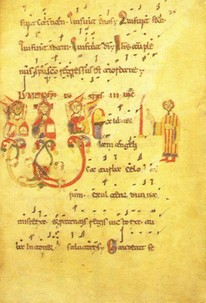
Miho Demovic, a Croatian musicologist, discovered some old partitures in the Vatican archives originatin from the territory of Croatia. Together with Hortus Musicus (Tallin Estonia), two concerts were organized within The Osor Musical Evenings, entitled Music in Croatia from 8th to 10th centuries, and Music in Croatia from 10th to 12th centuries. See here, and also Miho Demović: Liturgijski recitativi iz starih hrvatskih kodeksa od X. do XII. stoljeća, Zagreb, Kor Prvostolne Crkve Zagrebačke, 2000, ISBN 9005208-5-2, 400526039
The Cika Breviary from 11th century is important monument of Croatian culture written in the Benedictine Monastery of St. Krsevan in Zadar. It also contains musical notation, and is kept in Budapest in the Library of the Hungarian Academy of Sciences.
Vekenega Evangelistary, a top monument of Croatian culture, is a richly illuminated Latin text from the 11th century. It has been written in the famous Benedictine monastery of St Krsevan, and is kept today in the Bodleian Library in Oxford. Below you can see the neums accompaning the text.
Very old and valuable is the Dubrovnik Missal from 12th century, now kept in the Bodleian Library in Oxford. Written in Latin, in Beneventan script, it contains prayers and some chants unique in Europe. See [Menalo, pp. 34-35], and also Dubrovnik.
We can see musical notation also in the famous Trogir Evangelistary (Evangeliarium Traguriense), written in 1230-40, kept in the treasury of the cathedral in Trogir:
A special place in the history of Croatian music has the Glagolitic church singing. The earliest mention of glagolitic singing in Croatia is already from the year 1177, when Pope Alexandre III visited the town of Zadar, known for its very old and fruitful glagolitic tradition in Croatia . In the 1368 Missal of Duke Novak (held in the National Library in Vienna) there are symbols above the Glagolitic text which seem to denote the way of singing. The same holds for the Hrvoje Missal, written in ~1404 by scribe Butko probably in Zadar, kept in the Library of Turkish sultans in Constantinople in Turkey.
Glagolitic singing has three basic components - Gregorian coral, Croatian folklore and Byzantine church music. This type of church singing is still preserved on some Croatian islands. It represents a unique phenomenon in the history of European music, see- Stanislav Tuksar, Kratka povijest hrvatske glazbe, Matica hrvatska, Zagreb, 2000, p. 12,
- [Croatia - Europe, Volume I, Glagolitic singing by Jerko Bezic, pp 729-737],
- Katarina Livljanic, Music, in [The Croats - Christianity, Culture, Art], pp 183-192; the above Croatian glagolitic fragment with musical notation, found in Strahov in the Prague, is held at the University Library of Ljubljana, Slovenia, obviously a part of larger unknown Croatian manuscript from 15th century. According to Josef Vajs the fragment is the proof that also in church singing the Croatian glagolites were not behind the Latin clergy, see his book, p. VIII
- A small Croatian glagolitic fragment from 15th century with musical notation (neums) is held also in the library of Franciscan convent of Sv. Franjo Ksaverski in Zagreb (information by dr. fra Izak Spralja).
- [Vinko Zganec]
Ocara-Radio France and Harmonia Mundi, two renowned French publishers, issued a CD entitled Croatie. Musique d'autrefois, Croatia. Music of Long Ago (C 600006/HM79). It represents an anthology of Croatian traditional music. See also Katarina Livljanic below on this page.
The Passion procession on Croatian islands (like on Hvar for instance) has centuries old tradition with its roots in the Middle Ages. Passion processions are not organized by the Church or priests, but by laity, i.e. by confraternities of villagers. Musicologists consider passion songs in Croatia among the oldest in Europe. Each spring a festival of Croatian passion heritage (Pasionska bastina) is held in Zagreb. Its symbol is glagolitic letter A. In 1985 Maestro Ljubo Stipisic issued 8 cassettes representing Old Church (Glagolitic) folk songs from 15 places on the island of Hvar. These are records of very old tradition.
Les chantres de Pharos: Chants glagolitiques pour la
Semaine Sainte
Ile de Hvar, Croatie
ZA KRIZEM:
Glagolitic chant for Holy Week from Hvar, Croatia
The Pharos Cantors, recorded in June 1999 in Stari Grad,
Hvar, Croatia
produced by Nenad Bach
These Croatian glagolitic Lenten chants retrace a venerable and direct link to our ancestors, our roots, and our religious belief. Born out of Middle Ages, they continue to extend an unbroken tradition of Croatian history. They still resonate as part of our being, so let them be our pride, our support, and our hope.Dr. Vedran Deletis, New York
The Pharos Cantors (Hvarski kantaduri) sang their very old Lenten chants in Czechia, Great Britain, Bosnia and Herzegovina, Hungary, Germany, Spain, the USA, the Netherlands, Austria, etc. Example:
Examples:
See Pasionska bastina page (in Croatian), and listen to Madonna's weeping (Stabat mater dolorosa), a glagolitic chant from the island of Hvar (village of Vrbanja). Truly amazing way of singing (be patient while listening).
Mel Gibson's web page The Passion of the Christ also in Croatian.
Leos Janacek, Czechia, composed his famous Glagolitic Mass. According to The Penguin Guide to Bargain Records, 1966, GB, the text is taken from native Croatian variations of the Latin text (see p. 191).
The earliest known Croatian composers are Andrija Motovunjanin (born in the Istrian town of Motovun around 1470) and Franjo Bosanac (a Croat born in Bosnia around 1490).
- Croatian Middle Age Music, by Hana Breko (in Croatian)
- Glagolitic singing, by Gorana Doliner (in Croatian)
Petar Hektorovic, a well known Croatian poet, nobleman, connoisseur of Latin language and classical literature, wrote his Ribanje i ribarsko prigovaranje in 1568, which is the first realistic epic poem of Croatian Renaissance literature. It provides four folk tunes accompanied with musical notation. The book has been translated from Croatian into English in 1979 by Edward Dennis Goy under the title Fishing and fisherman's' conversation.
Bartol Gyurgieuvits (1506-1566), born in Turopolje near Zagreb, had spent 14 years enslaved in Turkish Empire. After his escape to Europe he published numerous works about the Turks. Among them is De Turcarum ritu et caeremoniis (where he is called Bartholomeus Georgievits), published in Amsterdam in 1544, in which he described among others the characteristics of music in Islamic society. It was among the first in Europe treating Islamic music, and was translated into seven languages. It was indeed very popular throughout Europe: the work had as many as 77 editions.
Juraj Hus, a Croatian captive in Turkey, became a military trumpeter for the Turkish army. Once he played his trumpet on the top of a pyramid near Cairo, 16th century!
The Croats can boast of having two excellent Renaissance composers. The first one is Julije Skjavetic (Schiavetti) from the 16th century. Between 1557 and 1573 he lived in Sibenik, and was conducting a choir in the famous Sibenik Cathedral. He wrote a collection of madrigals for 4-5 voices and a collection of motets for 5-6 voices (both published in Venice in 1563 and 1564 respectively). An important collection of his motets that was held in Dresden, disappeared after the destruction of the city in 1945. Luckily, it was discovered in Krakow in 1993.
Ivan Lukacic (1584-1648), a Renaissance composer born in Sibenik, was conductor and organist in the Split Cathedral. In 1620 he published a collection Sacrae cantiones, containing 27 motets for 1-5 voices accompanied by organs. Lukacic's collection was lost in the course of WW2, and rediscovered in the 1980's at the Jagiellon Library in Krakow, Poland. This is the only known copy.
Gabriello Puliti (1580-1643), an Italian priest, was an important composer for lute and organ in various Croatian towns of Istria. Another interesting Italian composer was Tomaso Cechini (1580-1644), an organist in the cathedral in Split and Hvar (on the island of Hvar). Both of them influenced the Croatian cultural circle in this region.
Besides Lukacic, Vinko Jelic (1596-1636) was the most important representative of Croatian church music of the time. He was born in Rijeka, and died in Alsace in France (Zabern). This Early Baroque composer is noted for introducing new techniques like chromatics and sequences into his music, which have just begun to appear in Europe. In 1622 he published a collection consisting of 24 motets (plus 4 other pieces) Parnassia militia in Strassbourg.
Otce nas (Our Father) in the Glagolitic,
Levakovic's
Glagolitic Missal, Rome 1631
Misa u Harvatski Jezik (=
Mass in Croatian Language) ,
kept in the Franciscan convent in Sinj, 1644
A true jewel of Croatian culture is Pavlinski zbornik (Paulist collection) from 1644, a collection of church chants. It is important in its language, text and sheet music. Paulists left important traces in Croatian culture during five centuries of their presence in Croatian lands from 13th to 18th centuries, see [Sekulic].
According to outstanding Croatian ecumenist, theologist and musicologist Juraj Krizanic (1618-1683), music should be regarded as a part of mathematics. In Rome he supervised a publication of musical works of the Portuguese king D. João IV.
Kristofor Ivanovic, a Canon of the town of Budva in Boka kotorska, published his Memorie teatrali in Venice in 1681. It the first history of Venetian opera, covering the period of 1637 - 1681. Its 2nd edition appeared in 1687.
Passionale Croaticum Almae Ecclesiae
Zagrabiensis, 1683
(kept
in the National and University Library, Zagreb)
For more information see Vjera Katalinic: Glazbena kultura u hrvatskim zemljama (Music Culture in Croatian Lands), [Baroque and Enlightenment, 17th-18th centuries, III, pp. 705-716]
Petar Nakic (1694-~1769), born near the town of Sibenik, and better known under his italianized name Pietro Nacchini, is one of the most important representatives of Croatian late Baroque and early Classicism. In various cities in northern Italy and in smaller number in Dalmatian part of Croatia (Nerezisce and Supetar on the island of Brac, the Cathedral of Rab on the island of Rab, church of St. Frane in Sibenik, Visovac covent on the Krka river) his workshop built more than 300 top quality organs (according to some data - more than 500!). He built sophisticated organs for the grand basilica in Padova (with 30 registers and 2 manuals), but it disappeared in the fire in 1926. In Croatia his organs are for example in Visovac, Sibenik, Makarska and Zaostrog. He also introduced some innovations in the construction of organs (tiratutti) that are in use even today, found new tonal ratios (mensura's), and founded a unique school for organ building in Venice.
Cithara Octochorda is the most significant old collection of Latin - Croatian Church songs, published in 1701 in Vienna, reprinted in 1723 again in Vienna, and in 1757 in Zagreb. This impressive, monumental book contains 235 Croatian songs in the Kajkavian dialect. The songs were a part of the so called Zagreb church service, that was cancelled in 1878. A very nice web-page devoted to this jewel of Croatian culture is provided by the British Library, London.
Luka Sorkocevic (1734-1789), whose beautiful symphonies are performed throughout the world, lived in Dubrovnik. The opening melody to this web page is his Allegro.
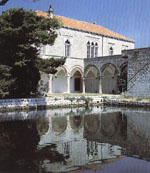
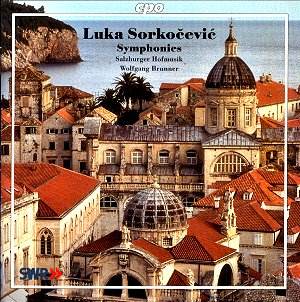
You can see a detail from the Dubrovnik polyptich by Lovro Dobricevic from 1466, representing an angel playing portative, a small portable organ:
Ivan Mane Jarnovic (Italianized name Giornovichi, 1740-1804) was an outstanding Croatian violinist and composer of the 18th century, probably from Dubrovnik. He had a true European career - playing, composing and conducting in France (Paris), Austria, Germany, Switzerland, Poland, Scandinavian countries, England. Also played the first violin in the orchestra of the Russian empress Katarina II. Jarnovic composed about 50 chamber instrumental pieces, 22 violin concerts (17 preserved), and is known for having introduced the romanza as a slow movement into the structure of the violin concert. His life is described in a novel Jarnowick by G. Desnoisterres - Le Brisoys, Paris 1844, and in a collection Scènes de la vie d'artiste by P. Smith (Une leçon de Jarnovic, Paris, 1844).
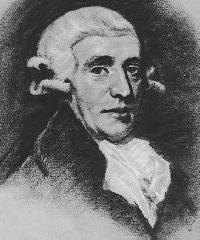 Our folk music is of great beauty
and variety. Some of its themes were used by famous European composers,
like Bedrich Smetana and Joseph Haydn, who spoke Croatian. Joseph Haydn (1738-1803) was born in a Croatian ethnic
enclave in Burgenland (Gradisce) in
Austria. For example the main theme of his London symphony no 104 in
D major (movement
IV) is based on the well known Croatian traditional song "Oj, Jelena,
Jelena, jabuka zelena" (Oj, Jelena, Jelena, my green apple). Also the
final of his Es major symphony is based on the Croatian folk song "Divojcica
potok gazi" (A little girl treads on a brook). And even the following
song that is widely known in Croatia - "Nikaj na svetu lepsega ni,
nego gorica kad nam rodi..." (There is nothing more beautiful in
the world than a fruitful hill) was exploited by Haydn (I
learned this on a wonderful 11th birthday party of my dear friend
Ema Tolic).
Our folk music is of great beauty
and variety. Some of its themes were used by famous European composers,
like Bedrich Smetana and Joseph Haydn, who spoke Croatian. Joseph Haydn (1738-1803) was born in a Croatian ethnic
enclave in Burgenland (Gradisce) in
Austria. For example the main theme of his London symphony no 104 in
D major (movement
IV) is based on the well known Croatian traditional song "Oj, Jelena,
Jelena, jabuka zelena" (Oj, Jelena, Jelena, my green apple). Also the
final of his Es major symphony is based on the Croatian folk song "Divojcica
potok gazi" (A little girl treads on a brook). And even the following
song that is widely known in Croatia - "Nikaj na svetu lepsega ni,
nego gorica kad nam rodi..." (There is nothing more beautiful in
the world than a fruitful hill) was exploited by Haydn (I
learned this on a wonderful 11th birthday party of my dear friend
Ema Tolic).
A famous compser Ludwig van Beethowen used a theme from Croatian folk song "Kisa pada, trava raste, bor se zeleni" for his Pastoral Symphony. A well known Czech composer Berdrich Smetana in his symphonic melody Vltava has the main theme (in minor) which is almost indentical with Croatian folk song (in major) "Mis mi je polje popasel". Information provided by Josip Zavrski, Skolske novine, 16. travnja 1991., p. 5.
Sir William Henry Hadow, renowned English scholar and musicologist (1859-1937), lecturer in Oxford, editor in chief of the Oxford Encyclopedia of Music (1901-1905), and a leading influence in English education at all levels in the 1920s and 1930s, wrote a booklet entitled
in 1897 in London (published by Seely and co. limited; reprinted in
1972 by Freeport, New York). This and other references related to Joseph
Haydn can be found at The
Library of Congress Citations:
Author: Hadow, William Henry, Sir, 1859-1937.
Title: A Croatian composer; notes toward the study of Joseph Haydn.
Published: Freeport, N.Y., Books for Libraries Press [1972]
Description: 98 p. illus. 22 cm.
LC Call No.: ML410.H4 H3 1972
Dewey No.: 780/.92/4 B
ISBN: 0836968816
Notes: Reprint of the 1897 ed.
Subjects: Haydn, Joseph, 1732-1809.
Names, Personal -- Croatia.
Control No.: 72004147 /MN/r972
Here we reproduce the concluding paragraph of Haydn's short biography presented by MusicaClassica:
A distinguishing trait of Haydn's works was his frequent use of Croatian folk music for his melodic material. Wrote W. H. Hadow: "The Croatian melodies are bright, sensitive, piquant, but they seldom rise to any high level of dignity or earnestness. They belong to a temper which is marked rather by feeling and imagination than by any sustained breadth of thought, and hence, while they enrich their own field of art with great beauty, there are certain frontiers which they rarely cross, and from which, if crossed, they soon return." Even many of Haydn's original melodies are characterized by typical rhythmic and melodic qualities to be found in the Croatian folk songs. However, as Franze Bellinger has added, "Haydn's speech, like that of every genius, was not only that of his race, but of the world." To these Croatian characteristics, Haydn added his high inspiration and sensitivity, and produced a type of melody which, for the most part, is unmistakably his.
Haydn is a common Croatian family name. In the Croatian telephone book you can see the names of Hajdin, Hajdina, Hajdinjak, Hajdinac, Hajdinovic: 63 families in the Zagreb county, 91 families in Medimurje and Varazdin counties, 65 families in Primorsko-Goranska county; and altogether 320 families in the whole Croatia (1999). There is a village of Hajdine near Vrbovsko in Croatia, on the main road to Rijeka, and the village of Hajdin near Vojnic. The name Hajdin (= hajda's) is derived from hajda = buckwheat.
Parents of Franz Joseph Haydn are Mathias Haiden and Anna Maria Haidin, as can be seen on their grave in the Rohrau cemetery even today. This is stated by outstanding Croatian musicologist academician Lovro Zupanovic in his afterword to the book of [Kuhac, pp 305-306]. Academician Zupanovic stated also the following:
"It is a pity that in his time Kuhac did not know for team work, or could not (was not allowed to?) accomplish. Otherwise - the redactor [ie. Zupanovic] is firmly convinced on the basis of own experience - ... that for half of names listed [by Kuhac] in his Hystorical introduction he would have no problems in proving their Croatian descent. This especially holds for Franz Joseph Haydn..." (see [Kuhac, p. 305]).
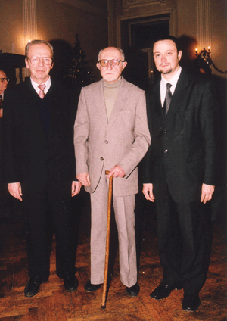
For those who can read Croatian, here is what academician Zupanovic wrote (see [Kuhac, pp 305-306]):
"Šteta je što Kuhač u svoje vrijeme nije znao za timski (grupni) rad, ili ga - ako mu je i bila poznata tehnika - nije umio/moga (smio?) ostvariti. Da mu je to uspjelo, on bi - priređivač je na osnovi vlastitog iskustva u to čvrsto uvjeren - zajedno s po jednim lingvistom, povjesničarom, arheologom, teologom i još pokojim (strukovno srodnim) znanstvenikom za polovicu imena što ih je naveo u Historijskom uvodu argumentirano dokazao njihovo hrvatsko podrijetlo. To osobito vrijedi za Franza Josepha Haydna, sina Mathiasa Haden-a i Ane Marije Haidin kako piše na nadgrobnom spomeniku koji danas stoji na groblju u Rohrauu. U svoje vrijeme - uz iznimku engleskoga muzikologa W. H. Hadowa (1859.-1937.) - posebice u njemačkim zemljama dočekana "na nož" a danas posvema odbačena, Kuhačeva pretpostavka ostaje ako ništa drugo a ono curiosum sui generis.
Let us add that the melody for the Austrian national anthem (and later the German anthem), composed by Joseph Haydn, is based on a very old Croatian folk song ("V jutro rano se ja stanem, rano pred zorom...", see the Oxford Music Dictionary). It is also significant that Haydn himself named the song Volkslied, before it became the anthem ("Gott erhalte Franz den Kaiser" - God Save the Emperor Franz). Compare the Croatian folk song

with the German national anthem:

See also sheet music taken from Austrian - American Magazine, March 2002. For more details see Hadow's analysis from his monograph A Croatian Composer; notes towards biography of Joseph Haydn (London 1897).
The poet J. W. Goethe translated some of our most beautiful folk ballades into German (from their Italian translation, done by Alberto Fortis; see his Viaggio in Dalmazia, Venice 1774). In this way Asanaginica obtained a European fame (translated also by P. Méerimée, W. Scott, A. Puskin, A. Mickiewicz and others). Only in Scotland it had three translations in the 18th and 19th century (including that of Walter Scott). This poem appeared most probably in Dalmatia in the 16th or 17th century and represents a jewel of Muslim-Slav oral tradition. After its Italian translation many other translations ensued: about ten translations into German, about the same number into French as well as English, and also translations into Swedish, Russian, Spanish, Romanian, Hungarian, Czech, Polish, Latin, Esperanto, Hebrew, Dutch, Albanian, Macedonian, Turkish, Persian, Danish, Ukrainian.
The verses for the Austrian national anthem "Land der Berge, Land am Storme", were written by Paula von Preradovic (1887-1951), Austrian writer and poetess, grand-daughter of the Croatian poet Petar Preradovic (1818-1872), with the music of W.A. Mozart.

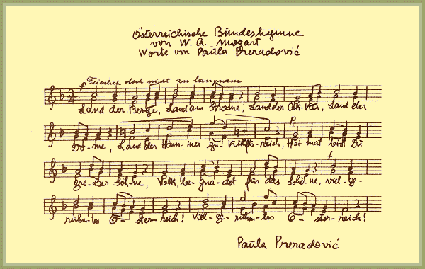
| Land der Berge, Land der
Ströme, Land der Äcker, Land der Döme, Land der Hämmer, zukunftsreich. Heimat bist du grosser Söhne, Volk begnadet für das Schöne, Vielgerühmtes Österreich, Vielgerühmtes Österreich! Heiss umfehdet, wild umstritten, Mutig in die neuen Zeiten, |
Land of mountains, land
on the river, Land of fields, land of cathedrals, Land of hammers, rich in outlook. You are the native home of great sons, A people uniquely gifted for the beautiful, Much applauded Austria. Fiercely embattled, ferociously contested, Courageously we stride |
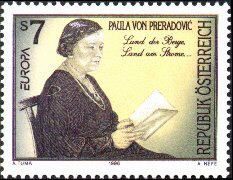
Paula von Preradovic on Austrian postage stamp, issued in 1996
She wrote a lot about Croatia, its people, history and nature, for example "Königslegende" in 1950, "Pave und Pero" in 1940, and "Dalmatinische Sonette" in 1933.
According to Franjo Kuhac (19th century), both Austrian and German anthem have been composed by Joseph Haydn in the 18th century, based on a slightly abridged Croatian folk melody "V jutro rano ja se stanem."
A lovely parade march called the Jelacic March (Op. 244), composed by Johann Strauss the Elder, was played by the composer and his orchestra in Vienna in 1849, one day after Josip Jelacic was proclaimed an honorary citizen of the city. A total of eight marches and one waltz were dedicated to J. Jelacic by various Austrian composers.
Very beautiful traditional song of Bosnian Croats is S onu stranu Plive (On the other side of the Pliva river). Since the creation of Bosnia and Herzegovina as an independent state in 1992, the song has been chosen as the national anthem of this state.
The first national operas among the Slavs were composed by Russians (M. I. Glinka, 1836, 1842), then the Croats follow immediately. Vatroslav Lisinski composed the first Croatian national opera "Ljubav i zloba" ("Love and malice") in 1846. Then follow the Czechs (B. Smetana in 1862), and these three nations are the only ones among the Slavs who have national operas.
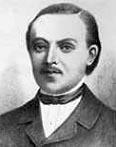
Let us mention that Franz Liszt gave piano concerts in Zagreb (see here, in Croatian) and in Samobor, a lovely nearby town, in 1846. Operas composed by Ivan Zajc (1832-1914) and Jakov Gotovac (1895-1982) are performed in concert halls throughout the world. The most famous opera of Jakov Gotovac is Ero s onoga svijeta, which has been translated into 9 languages and performed in about 80 countries.
It seems that a well known tune "U boj, u boj!" from the opera Nikola Subic Zrinski by Ivan Zajc is taught in Japanese schools. Information by Mr. Nenad Bach, New York. Professor Vladimir Devidé, outstanding japanologist from Zagreb, considers this very probable: he remembered a very young boy walking on a Tokyo street Komaba, wearing a huge rucksack filled with books, and whistling the familiar melody - "U boj, u boj"! (this occurred in 1961, during his first visit to Japan; personal information, 2004).
"U boj, u boj!" for Japanese readers, with historical account, where you can listen to the tune performed by Japanese choir singing in Croatian! (Provided by Kwansei Gakuin Glee Club).
U boj, u boj! is a web web page where You can find additional information, including libretto in Croatian. Listen to Japanese student choirs singing in Croatian:
We cannot avoid the fact that some outstanding historians of Croatian music (like Lovro Zupanovic, Ennio Stipcevic) prove that the first Croatian opera was composed almost 80 years earlier than "Ljubav i zloba" by Lisinski. The name of the composer is Julije Bajamonti (1744-1800). In 1796 he wrote an article "Il medico e la musica" ("The physician and music"), an essay on musical therapy, one of the first in history, in which he showed that music has therapeutic strength. He was the most versatile and fertile Croatian composer of the time (230 compositions, some of them fragmentary). Bajamonti composed sacred music for verses in Latin, Italian, and Croatian: for example La passione de Gesu Cristo (cantata to words of Pietro Metastasio), Requiem (composed on the occasion of death of Rugjer Boskovic, commissioned by the Dubrovnik Senat in 1787), Spiritual songs to Croatian verses. In 1767 he composed an oratorio which represents the first Croatian opera, and according to Lovro Zupanovic, the most beautiful work of its time in this country. He also wrote the first Croatian oratory (La translation di San Diomo), one of the highest achievements of Croatian 18th century music.
The verses for the Croatian national anthem Our Beautiful Homeland (Lijepa nasa domovino) were written by a Croatian poet and diplomat Antun Mihanovic (1796-1861).
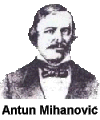
|
Lijepa
naša domovino
|
Our
Beautiful Homeland
|
| Lijepa
naša domovino, Oj junačka zemljo mila, Stare slave djedovino, Da bi vazda česna bila! |
Beautiful is
our homeland,
|
| Mila,
kano si nam slavna, Mila si nam ti jedina, Mila, kuda si nam ravna, Mila, kuda si planina! |
You are our only
glory,
|
| Teci,
Sava hitra, teci Nit ti Dunaj silu gubi, Kud li šumiš, svijetu reci: Da svog doma Hrvat ljubi. |
Sava, Drava,
keep on flowing,
|
| Dok
mu njive sunce grije, Dok mu hrastje bura vije, Dok mu mrtve grob sakrije, Dok mu živo srce bije! |
When his fields
are kissed by sunshine,
|
A famous Ukrainian linguist Agatangel Efimovic Krimski, or Agatangel Kryms'kij (1871-1942), founder of the Ukrainian Academy of Sciences, and its lifelong president, suggested during the 1934 Congress of Soviet writers that the USSR national anthem should be composed according to Croatian anthem. Maksim Gorki, his close friend, claimed that the Croatian anthem is the most beautiful among anthems of all peoples of the world, since he had opportunity to listen to it from some Croats during a fair held in Nizhnij Novgorod. See Dragutin Em. Safar: Krimski - veliki prijatelj Hrvata, Marulic 5/2001, Zagreb, pp 943 -946. Maksim Gorki translated Lijepa Nasa from Croatian into Russian, see [Sekulic, p. 374].
It is sometimes claimed that the music for "Lijepa nasa" (Our Beautiful) was written according to Donizetti's "O sole piu ratto" from the opera "Lucia di Lammermoor". However, as I was informed by Emil Cic (musicologist and musical critic, Zagreb), this is not true. Indeed, see the partiture. Josip Runjanin, who composed the melody for Lijepa Nasa, is sometimes claimed to be a Serb born in Croatia, which also is not true. See a monograph written by Andrija Tomasek, "Lijepa nasa - povijest jedne zablude", Muzicki informativni centar Koncertne direkcije Zagreb, 1990. Hearing a remark about alleged Serbian origin of her father, Runjanin's daughter exclaimed: "But, my father was a Croat!" Runjan was born in Vinkovci, of pravoslav (Orthodox Christian) parents, and a great Croatian patriot (see [Kuhac, pp 231-244]). It is little known that Lijepa Nasa was proclaimed Croatian national anthem in 1891 after suggestion of Dalmatian Croats (ibid., p. 237). Many people have already remarked exceptional poetic value Our Beautiful (Lijepa Nasa). For instance, compare its content with the bloody message of the French national anthem.
Ivan Padovec (1800-1873), born in the beautiful baroque town of Varazdin (known for its festivals of baroque music) was a guitar virtuoso, who gave concerts in Zagreb, Vienna, Prague, Budapest, Hamburg, London, in Poland, Russia etc. He constructed a ten string guitar. Also, he published his Teoretish - praktische Guitar - Schule in Vienna in 1842.
Mirko Orlic: Ivan Padovec, Croatian guitarist of europen renown, Gitara 2, 2000., in Croatian [PDF]
Illma de Murska (born as Ema Puksec in the town of Ogulin, 1834 - 1889) was an opera diva of international fame, nicknamed Croatian canary and Croatian nightingale. She sang in Italy, Spain, Hungary, and her most fruitful period was in Vienna, Austria. She also sang in Berlin, Hamburg, Paris and London, and had tours in Australia, Russia, USA and New Zealand. In St. Petersburg she was singing at the Court and the Russian Czarina crowned her with a brilliant diadem (see here for more details). In Melbourne, Australia, there is a street called De Murska Street in her honour.

The prima donna Ilma di Murska on the London stage
Joseph Angster (1834-1918) was born in Jagodnjak
(Kacsfalu) in eastern Croatia (near Danube river),
famous church organ constructor. His organs can be found in many
churches in Austria, Hungary, Croatia, Czech Republic, Slovakia,
Slovenia, Serbia & Montenegro, Poland, in Rome -Italy, Romania and
Ukraine. He participated in organ construction for Cologne-castle,
Notre-Dame church in Paris and for St. Trinity church
organ.
Many thanks to Mr. Darko Varga
(from Bilje, Baranja) for having contributed Angster's biography to
this web.
Franjo Krezma (born in Osijek in 1862)
had a reputation of an authentic violin virtuoso, and was a concert master
in the Royal orchestra in Berlin (today's Berliner Philharmonie) at the
age of 17. Already at the age of 16 he was admired in many European cities:
Rome, Prague, Genova, Paris, Vienna, Venice. Once he played also with
Franz Liszt. Having inscribed the Conservatory of Vienna at the age of
9 as the youngest student ever, he completed his studies at the age of
13, after which started his spectacular European career. Such musicians
like Giuseppe Verdi, Franz Liszt, Henry Vieuxtemps considered him a successor
of Paganini. Unfortunately, he died very young at the age of 19.
About 100 of his pieces have been discovered by Kresimir
Marmilic in Zagreb in 1996!

Jednoč, kada se je Krežma sa svojim sinčićem šetao prema
Savi, te došao k livadi na kraju savske ulice, kaže
Franjo: "Otče, deder da malo stanemo, ja bih slušao, kako
žabe krekeću." A tada će: "Slušaj samo, otče, ona žaba
tamo na desno pjeva tenor, ona tamo s lieva bas, a ovi tu
malo bliže srednje glasove, sbilja cieli kvartet; ali ove
tu kraj jarka kvare harmoniju, jer dočim sbor pjeva u
dur-priemetu, ove tamo krekeću u molu." Otac se nasmije,
te mu odvrati: "Nemoj ludovati", ali Franjo mu reče: "O,
mene moj sluh ne vara."
Croatian violinist and violist Louis Svecenski (1862-1926) was born in Osijek and studied at the Vienna Conservatory. He was a member of the Kreisler Quartet in the period of 1885-1917, and director of the New York Institute of Music. Also, he was one of the founders of Curtis Institute of Music in Philadelphia.
Franjo Dugan (1874-1948), studied mathematics and physics, and was outstanding organ player and composer, the Zagreb Cathedral organist since 1910. See his short biography at A Directory of Composers for Organ, provided by John Henderson (of the Royal Society of Church Music, UK).
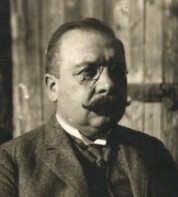
It is maybe worth mentioning that the French pianist Alfred Brendel, at that time 10 years old, met Dugan in Zagreb, who gave him lessons that he found extremely useful.
Rudolph Matz (1901-1988) is perhaps the greatest cello theoretician in the world (opinion expressed by Leonard Rose). He wrote manuals for cellists that even today are considered among the best for young cellists throughout the world. Matz studied cello, composition and conducting at the Zagreb Academy of Music, and became professor of cello at the University of Zagreb in 1950, where he stayed until his retirement in 1972. He wrote about 300 vocal and instrumental compositions, about 100 of them for cello. He is the author of the monumental 32 volume Prve godine violoncella in Croatian (1948-1962), translated into English as First Years of Violoncello. He also wrote the widely used For Young Hands, 54 Short Etudes.
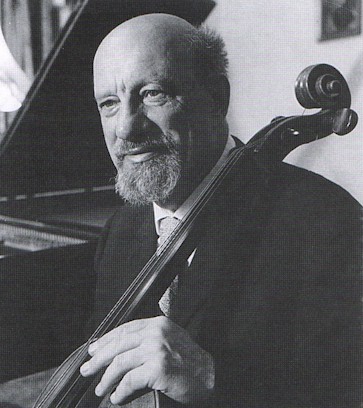
Rudolf Matz, photo from Physicians Singers of Zagreb
Rudolph Matz was a top Croatian sportsman. As a sprinter he won the first place in the Prague in 1921, beating also German sprinters. He was a record holder in Croatia on 100 (for 11 years!), 200, 4x100, and 400 m. He stressed that the work of a music educator is similar to that of a trainer.
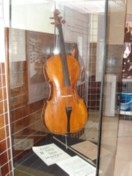
Matz served as a jury member at the International Tchaikovsky Competition in Moscow in 1966, 1970 and 1974, and at Gaspar Cassado's competition in Florence in 1973. Matz was also a pioneer in establishing the field of music therapy as a profession in Croatia. He founded among other the Zagreb Chamber Orchestra, predecessor of the Zagreb Soloists (I Solisti di Zagreb). Since 1996 an annual International Competition Rudolph Matz is held in Dubrovnik organized by Croatian String Teachers' Association. A monograph published in honour of Matz has been written by an american musicologist:
Margery Enix: Rudolf Matz - Cellist, Teacher, Composer, Dominis Music, Ottawa 1996
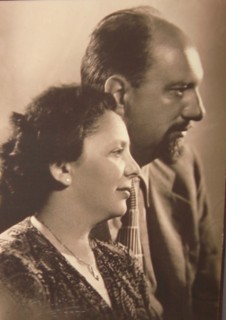
University of North Carolina, Greensboro, USA, keeps archival material:
- Rudolf Matz Biography
- Rudolf Matz Archival Materials,
- The Contents of the Rudolf Matz Cello Music Collection
Rudolf and Margita Matz Memorial Collection will be set up in their appartment in Zagreb, Mesnicka 15, which once famed for its encounters with musicians and intimate concerts. In 1967 Matz was visited by a celebrated cellist Mstislav Rostropovich.
Any admirer of classical music certainly knows the Zagreb Soloists, conducted by maestro Tonko Ninic (until 1997).

![]()



In the last 50 years they had more than 3500 concerts, among others in the Royal Albert Hall and Royal Festival Hall (London), in Carnegie Hall (New York), Musikverein (Vienna), in Mozarteum (Salzburg), in Hercules (Münichen), in Tonhalle (Zürich), in Teatro Real (Madrid), in Concertgebouw (Amsterdam), in Salle Pleyel (Paris), in Santa Cecilia (Rome), in Cajkovski concert hall (Moscow), in Opera House (Sydney), in Festival Hall (Osaka), in Coliseo (Buenos Aires), in Victoria Hall (Singapur). They also had solemn concerts at the General Assembly of the UN.
During the Croatian War of Independence the Zagreb Soloists gave about seventy benefit concerts (to raise founds for Dubrovnik, destroyed schools of music in Croatia, then for the destroyed building of the Croatian National Theatre in Osijek, Children' s Hospital in Zagreb, devastated Croatian churches and monuments). They also played a series of concerts to celebrate the newly-independet Republic of Croatia. Source: Hispania Clasica.
- The Zagreb Philharmonic Orchestra
- The Zagreb String Quartet, founded in 1919, which
performed about 5,000 concerts until the end of 20th century, many
of them throughout
the world.
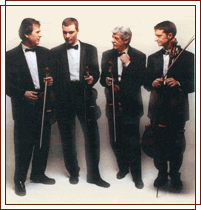
- Dora Pejacevic
(1885-1923) is the first important female composer in
Croatia; in her short life she left behind her a rich
opus of 58 pieces; she was portrayed among others by
Maximilian Vanka (see below).
Her works have been played already during her lifetime in Dresden, München,
Prague, Budapest, Vienna, and in her native Nasice in Croatia.
A regular Memorial of Dora Pejacevic is held in Nasice.

Dora Pejacevic: Allegro, [wma] 9.2 MB,
live performance in the chapel of Prandau - Normann palace, Valpovo, 2005,
Mirta Pletersek-Blaskovic (violin) and Petra Gilmung (piano), with kind permission - Krsto Odak (1888-1961), important Croatian composer of sacral music, in particular church music inspired with old Croatian glagolitic texts.
- the violinist Zlatko Balokovic (1895-1965);
he was in possession of Guarneri's famous violin "the King" from 1735
(one of the last violins built by Giuseppe Guarneri del Gesù, "the
King" was named in honour of King Joseph of Hapsburg, estimated
to nine million dollars);
he
donated
"the King" to
his
beloved city of Zagreb in 1964;
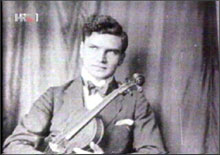
 Guarneri's famous violin "the King" from 1735 ,
Guarneri's famous violin "the King" from 1735 ,
kept in Zagreb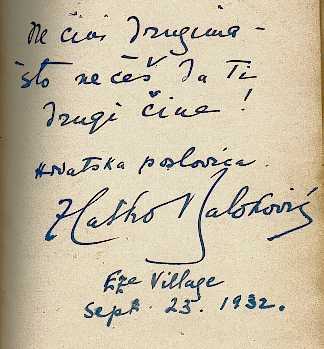
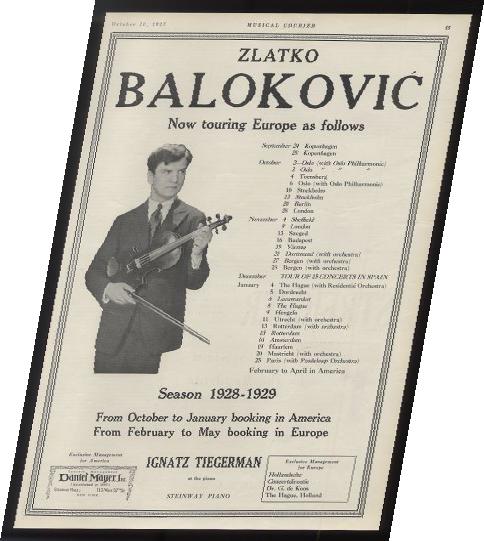
Balokovic's series of concerts in Kopehnagen, Oslo, Stockholm, Berlin, Budapest, Vienna, Dortmund, The Hague, Utrecht, Amsterdam, Maastricht, Paris, 1928-1929.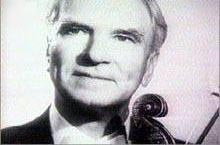
In 1966 his widow Joyce Barden Balokovic founded Zlatko and Joyce Balokovic Scholarship from which HAZU allocates stipends for gifted Croatian students to study at Harvard University - Lovro von Matacic, one of the greatest
conductors of the 20th century (1899-1985), started his career in
1919 as conductor of
orchestras in Osijek, Novi Sad, Ljubljana, Belgrade, Riga, and
in Zagreb in 1932. From 1942-1945 he was conductor of
the Vienna Opera. After 1945 he was imprisoned by the
Yugoslav communist regime, and together with Croatian
poet Tin Ujevic
and painter Kristian Krekovic sentenced to
confiscation of all movable and immovable property. In 1950's he became
organizer of Festivals in Dubrovnik and Split. In 1956
Matacic moved to Germany to conduct East Berlin
Opera and the famous Dresden Staatskapelle, then
conducted at
Bayreuth in 1959, and from 1961 to 1966 was
Gereralmuikdirektor in Frankfurt. He was also
guest conductor in Vienna Opera, Milan Scala, in
Chicago, Naples, Palermo, Rome, London, Cleveland,
Tokyo, Prague, etc., and was elected the honorary
director of the Japanese Orchestra in Tokyo.
From 1970 to 1980 he
was conductor and artistic director of the Zagreb
Philharmonic Orchestra, and almost simultaneously from
1973 to 1979 had the same role in the Monte Carlo
Orchestra.
Lovro Matacic is laureate of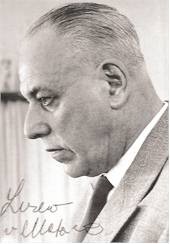
- the Bruckner Medal and of the International Bruckner Society, recipient of the Bruckner Ring from Viennese Symphonic Orchestra (one among only a few of the most outstanding conductors),
- recipient of the Smetana Medal from the Czech government and Janacek Medal,
- Hans von Bellow Medal from the Berlin Philharmonic Orchestra,
- medal for artistic work from the Prince Rainer of Monaco,
- the Cross of the First Order for Science and Art from the president of Republic of Austria,
- and of numerous recognitions in Croatia.
- Boris Papandopulo (1906-1991), a composer and conductor,
- opera singers
- Josip Kasman (1850-1925), born on the island of Losinj, baritone, and the first Croat that had opportunity to sing in the New York Metropolitan (in 1883),
- Milka Trnina (or Ternina, 1863-1941);
according to Giacomo Puccini, author of the famous opera Tosca,
she was the best "Tosca" that he had opportunity to listen to
(on the London première in 1900); see
Milka
Ternina at the Royal Opera House, Covent Garden; only in Convent
Garden in London Milka had 56 performances between
1895 and 1906.
Also, she was the first Tosca in Great Britain and in the United States.
She sang at the ceremony of coronation of the Russian Tsar Nikolai II. One of the waterfalls of the Plitivice Lakes (a famous National Park in Croatia) is named after Trnina in 1898. For more information see the following monograph: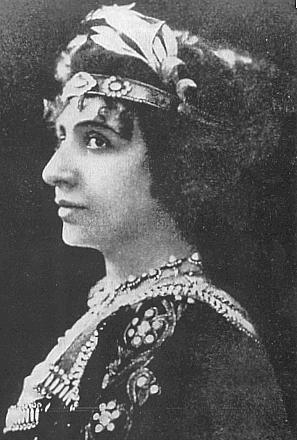
Nada Premerl: Milka Ternina and the Royal Opera House (in English and Croatian), Muzej Grada Zagreba, Zagreb 2006. ISBN 953-6942-24-0
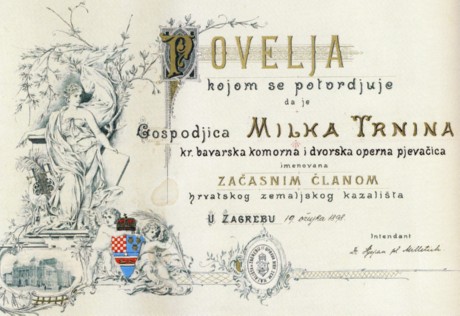
1898 Charter from the Croatian National Theatre in Zagreb conferring honorary membership to Milka Trnina (source [Premerl, p 86]), containing the Croatian Coat of Arms
Did You know that the name of the famous MILKA chocolate, Switzerland, had been given in honour to Milka Trnina, Croatian opera diva?
Saviez vous que le célébre chocolat porte le nom de "Milka" en l'honneur de Milka Trnina, chanteuse d'opéra originaire d'Ivanic Grad en Croatie. Le fondateur de la marque étant un admirateur de la diva croate, il décida de donner son nom, Milka, a son entreprise et son chocolat.
- Maja Strozzi-Pecic (1881-1962), Thomas Mann wrote about her in his Dr. Faustus ("...she is probably the best soprano of both hemispheres"), while Igor Stravinski devoted his four compositions to her.
- Zinka
Kunc-Milanov (1906-1989),
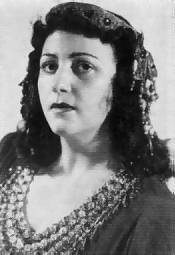
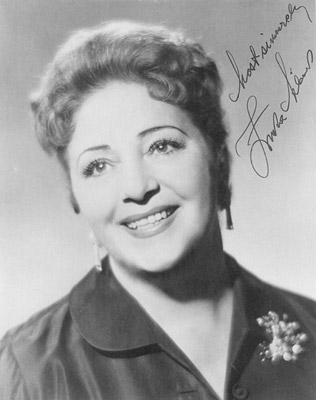
- Djurdja Milinkovic (1913-1986),
- Srebrenka
Sena
Jurinac (1921),
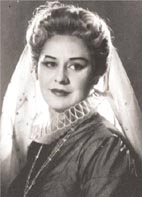
- Dragica Martinis (1922),
- Nada Puttar - Gold (1923),
- Biserka Cvejic (r. Katusic) (1923), laureate of the French Legion of Honor in 2001,
- Ruza Pospis-Baldani (1942),
- Dunja Vejzovic (1943),
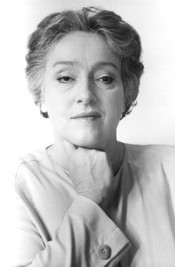
- Vladimir Ruzdjak (1922-1987),
For more information see Croatian Opera Singers 1945 - 2002 (in Croatian).
A famous opera singer Tino Pattiera (1890-1966) was born in the lovely town of Cavtat near Dubrovnik. His career started in Croatia, in the Opera of Osijek, where he sang as baritone. Pattiera was teaching singing in the Prague and in Vienna (Academy of Drama and Music). He is buried in his native town of Cavtat.
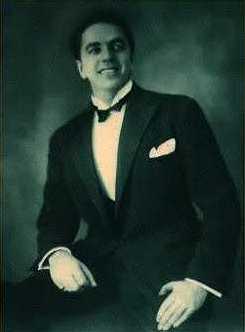
- Andjelko Klobucar (1931), organ player and church music composer, played throughout Europe, including the church of Notre Dame in Paris, Westminster Abbey in London, Basilica of St. Maria degli Angeli in Assisi.
- Berislav Klobucar (1924), one
of the greatest
Croatian conductors, born in Zagreb, student of Lovro pl.
Matacic, started his impressive
career leading the Zagreb Philharmonic
Orchestra.
- He conducted the Vienna State Opera for more than forty years (1133 performances in 56 operas!).
- During ten years Klobucar directed Symphonic Orchestra and the Opera in Graz, Austria.
- During nine years he was director of the Opera of Stockholm, Sweden.
- During six years Berislav Klobucar was director of Opera and Philharmonic Orchestra in Nice, France.
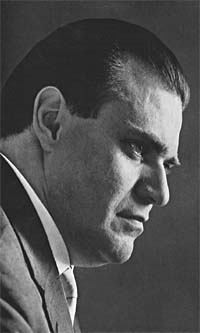
- Miroslav Miletic, viola player, founded the Pro Arte string quartet in Zagreb, which in 1970's was among 10 best string quartets in the world. Among his numerous students was Hiroshi Hirano, violist from Japan (Tokyo). As a composer he promoted Croatian folklore and church music (in particular from the island of Hvar). He considers the Croatian folklore music the most beautiful and the richest in the world. In 1975, accompanied by the Leningrad Philharmonic, he played his Viola concert. Maestro Miletic collaborated also with K. Stockhausen on electronic music. He has his works published at Schott, Berben, Meckverlag, Pizzicatto etc, and an LP issued in the USA.
- Milan Turkovic, one of the few internationally known bassoon soloists, originates from an Austro-Croatian family. He is a member of the Ensemble Wien-Berlin (a woodwind quintet he formed together with principal players of the Berlin and Vienna Philharmonic), the Concentus Musicus of Vienna, and the Chamber Music Society of Lincoln Center in New York.
- Vjekoslav Sutej (1951),
a renowned conductor (for four consecutive years conducted the Viennese
Symphonic Orchestra during Christmas concerts
held in Vienna, with the participation of such famous singers like
Jose Carreras - concert in Arena di Verona in 1995, Placido Domingo,
Luciano Pavarotti, the event being transmitted
worldwide), from 1990 to 1993 musical director of
Teatro La Fencie in Venice, conducted the Royal Philharmonic Orchestra
in Sevilla (Spain) from 1990 to 1996,
and the Houston opera orchestra (the USA) from 1992 to
1997, conducted Carmen in Arena di Verona,
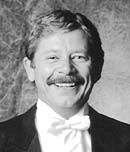
- Academic choir Ivan Goran Kovacic
- Lyra, excellent choir of the Jewish Community
in Zagreb, winner of many international competitions (including the
one held in Yerusalem in August 1996 on the occasion of 3000 years
of the city), conducted by Emil Cosetto. He has very nicely
arranged numerous folk songs from various parts of Croatia for choir
singing.
Mr Cosetto is also known to have rearranged a beautiful Croatian song Fala (Thank you) as a funeral song on the occasion of Tito's death in 1980, thus distorting its original message. - Collegium pro Musica Sacra has won silver medal at the fourth International competition of church choirs "Giovanni Pierluigi da Palestrina" held in Jerusalem, on the occasion of 3000 years of existence of this ancient city.
- Akademski zbor bazilike srca Isusova (academic choir), conducted by Robert Homen, with its 100 singers, has won the first place at VI Concorso internazionale di Musica Sacra "Giovanni Pierluigi da Palestrina" held in Rome in Chiesa di Sant' Ignazio in 1988, in the category of mixed choirs.
- Cesarice, a small women's choir founded in 1993 (students
of University of Zagreb), with repertoire mostly related to Dalmatian
folk
songs, and conducted by Bojan Pogrmilovic, has won the first
place on prestigiousIX Concorso Internationale do Canto Corale
1998,
held in Verona, Italy. During the XI Concorso Internationale
held in 2000, among 24 participating choirs from Europe and Australia,
the Croats occupied four first places: Dalmatinke from Split
and Blajke from Blato on the island of Korcula (women's choirs),
Luka from Ploce and Vokalisti Salone from Solin (men's
choirs). This is already fifth consecutive win of Croatian choirs
on
this prestigious international competition in Verona.

Melita Lorkovic (1907-1987) was an internationally known classical pianist... Her successes were tempered by the years shortly after the war [1945] when her husband Radoslav Lorkovic Sr. was shot by Tito's communist regime. Following a devastating period of being thrown out on the street with two children and losing her position at the University [of Zagreb], she survived in a small flat teaching neighborhood kids piano lessons... At a concert in Belgrade Tito himself attended the performance and was so impressed that he went backstage and asked if there were any personal favors he could grant Ms. Lorkovic. Melita responded, "Yes. Could you tell me where you shot my husband?" ...
Source: Radoslav Lorkovic, grandson of killed Radoslav Lorkovic Sr. Radoslav Lorkovic Jr, a contemporary USA musician, was born in Zagreb, Croatia, in 1958.
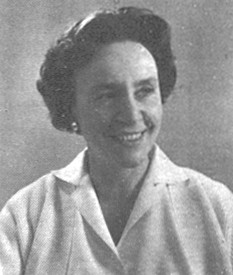
Melita Lorkovic was professor at the Music Academy in Zagreb (1929-1945), at the Music Academy in Belgrade (1948-1960), and at the National onservatory in Kairo (1960-1972).
Radovan Lorkovic (1932), professor of violin in Basle in Switzerland and concert master, conducted a concert ensemble Musica Viva - Basel. See his article writen in Croatian: Sjecanja na neke nastupe i djelovanje hrvatskih glazbenika u Svicarskoj.
Artists of international reputation:
- the violoncellist Valter Despalj (1947), with violinist Maja Despalj-Begovic founder of private music school for exceptionally gifted children, see STRINGS ONLY!, Zadar, Croatia (Despalj School of Music)
- the violoncellist Monika Leskovar (1981),
winner of the prestigious Tchaikovsky competition in Japan for
1995 (a student of maestro Valter Despalj), the third prize
at the 1997 Rostropovic competition in Paris, the second prize
at the 1998 Eurovision contest for young instrumentalists, winner
of the
1999 Roberto Caruana competition in Milano, Italy, the second
prize at the famous ARD competition in 2001.

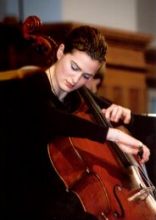
- the violoncellist Stjepan
Hauser (born in 1986; photo from croatia.org),
member of the Greenwich Trio founded in 2005, regarded by critics
as one
of the leading cellists of our time,
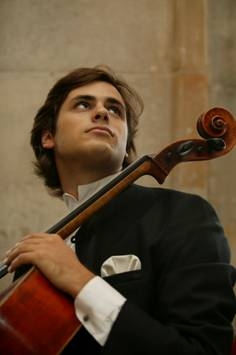
- the pianist Vladimir Krpan (1938), president of EPTA (European Association of Piano Teachers) during many years,
- the pianist Ivo Pogorelic (1958),
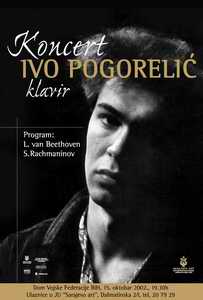
- the pianist Lovro Pogorelic (1970), Ivo's brother,
- the pianist Kemal Gekic,
- Radovan Vlatkovic (1962),
distinguished horn soloist, playing in the Philharmonic Orchestra of Berlin,
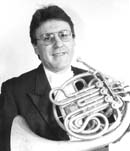
- the Zagreb guitar trio: Darko Petrinjak, Istvan Römer, Goran Listes,
- Viktor
Vidovic (1973) and
Ana Vidovic
(1980), brilliant guitarists (brother and sister); Ana has won the
1998 International Guitarist Competition "Francisco Tarrega"
in Benicasim, Spain, among forty competitors
up to the age 32, see Toutes les qualités d'une
jeune virtuose at Societé luxembourgeoise de
guitare classique. She also won first prizes at "Albert
Augustinum International Competition" in Bath, England,
at the "Ferdinando Sor Competition" in Rome. She had
concerts in London, Paris, Vienna, Salzburg, Rome,
Budapest, Warsaw, Tel Aviv, Copenhagen, Tronto, San
Francisco, Houston, Austin, Dallas, St Luis. Ana
entered the Music Academy in Zagreb at the age of 14, as its youngest-ever student.
For a more detailed information see vidovic.com.
Watch and listen to Ana's concert in the Kennedy Center
in Washington DC, 2004.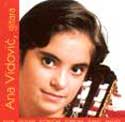
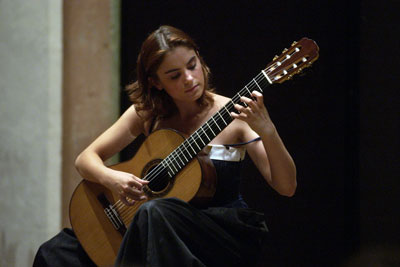
- Zoran
Dukic (1969), a Croatian
classical guitarist, a student of maestro Darko Petrinjak in his native
Zagreb, is one of the most prominent players of the new generation.
He won
an amazing number of prizes, more than any other guitarist in
the world. Here are some of them (source www.gitarrist.net):
- First Prize International Guitar Competition in Mettmann, Germany 1991.
- First Prize Andrés Segovia Int. Guitar Competition in Palma de Mallorca, Spain, 1991.
- First Prize Dakar International Guitar Competition in Senegal, 1992.
- First Prize Guerrero International Guitar Competition in Madrid, Spain, 1992 plus the special jury prize for the best interpretation of Spanish music).
- First Prize 20th International Guitar Competition in Vina del Mar, Chile, 1993 plus the Prize of the Public
- First Prize 20th Francisco Tárrega Int. Guitar Competition in Benicasim, Spain, 1994 plus received the Prize of the Public
- First Prize International Guitar Competition Printemps de la Guitarre Belgium, 1994 plus the Special Prize from the Belgian Composers Association
- First Prize Andrés Segovia International Guitar Competition in Granada, Spain, 1996 the only guitarist to win both of the Andrés Segovia competitions Granada & Palma
- First Prize De Bonis International Guitar Competition in Cosenza, Italy, 1997 plus the Prize of Public
- First Prize Manuel Maria Ponce International Guitar Competition in Tredrez-France,
1996
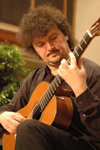
- Robert Belinic (1982) has been
acclaimed in the New York press as "a consummate musician of grace
and stature
who turns mere notes into magic." Croatian guitarist Robert Belinic
was the sole winner of the 2001 Young Concert Artists European Auditions
in Leipzig, Germany. In 2002, he became the first guitarist to win
the Young Concert Artists International Auditions in New York. He is
recipient of the Fergus New Artist Prize, Princeton University Concert
Prize and the
Beracasa Foundation Prize
.

- Maksim Mrvica, a young pianist born in
1975 in Sibenik, who has won the Nicolai Rubinstein International
Competition of Pianists in Paris in 1999, and the International Pianist
Competition Pontoise in Paris in 2001 (his second name - Mrvica
- means "crumb" in Croatian language!).
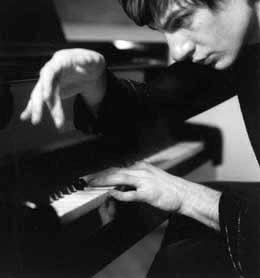
- in jazz - a vibraphonist Bosko Petrovic (1935).
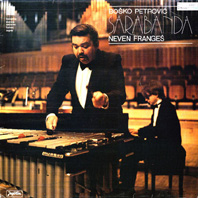
Mia Slavenska (born in Slavonski Brod, 1914-2002), became ballerina of the Zagreb Opera (1930-33), studied also in Vienna, and joined the Paris Opera in 1933. In London she danced with Anton Dolin before joining the Ballet Russe de Monte Carlo (1938-42). She later formed her own company, Ballet Variante. In 1953 she established the Slavenska-Franklin ballet company with Frederic Franklin. In 1950's she was prima ballerina of the Metropolitan Opera in New York. By the end of her career she was teaching in Los Angeles, California. Slavenska starred in a wonderful French film, La Mort du Cygne (1938).

www.slavenskadancepreservation.org
The Dubrovnik Summer Festival, which puts on dramatic, music and ballet art, was founded in 1950. A special attention is devoted to the plays of Marin Drzic and William Shakespeare. Especially famous is the Hamlet performance on the old tower of Lovrijenac. Due to its exceptional ambience, offering enormously powerful aesthetic experiences, it is regarded to be the best stage for Hamlet in Europe.
The Osor Musical Evenings (Osorske glazbene veceri ) have been founded in 1976 by Mr Danijel Marusic, a well known Croatian film producer (known for having produced "Nase malo misto"). Osor is a beutiful and very old stone town at the joint of two islands - Cres and Losinj. The music evenings take place each year in July and August with classical repertoire, including masterpieces of Croatian masters, old and new.
Musical Evenings in Donat, a summer festival in Zadar which began in 1961, include performances of medieval, renaissance and baroque music. A large number of outstanding European ensembles participated with masterpieces not only from their own country, but also with Croatian musical heritage (Skjavetic, Lukacic, Bosanac and others). See Dr Katarina Livljanic: A Sketch on a Fulfilled Wish, PDF, in Croatian and English.International Violin Competition Vaclav Huml, Zagreb, Croatia
The well known musical ``The Canterbury Tales'', which played in London for quite a long time, was directed by Vlado Habunek, an outstanding name in theatrical life of Croatia.
An important cultural manifestation held in Zagreb is the Music Biennale, devoted to contemporary, experimental and avant-garde music. It has already a long tradition: in 1995 we had the 18th Biennale. Let us mention only a few names:
- Milko
Kelemen, professor of composition in Stuttgart, who founded
the Biennale; his Requiem for Vukovar, Osijek, Dubrovnik, Sarajevo,...
has been performed in the music hall of the G. Pompidou Centre in Paris
in March 1995 by the 2e 2m Orchestra (conducted by Paul Mefano).
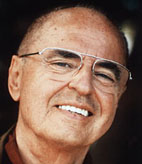

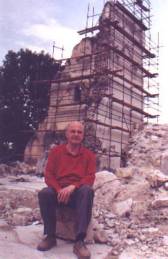
- Josip Magdic (1937), whose masterpieces attract attention of the European cultural audience in the recent years: some of them are devoted to the study of sounds of war he experienced during three and a half year's Greater Serbian siege of Sarajevo (April 1992- November 1995), capital of Bosnia and Herzegovina. He also created a music caricature about the UNPROFOR eternal and unforgettable statement: We do not know who is shooting.
- Igor Kuljeric (1938-2006), outstanding Croatian composer and conductor, known for his volcanic energy, finding inspiration among others in very old Croatian glagolitic heritage. We cite his reflections about Croatian music: Pluralism and rich diversity of Croatian musical heritage - from the oldest, almost archetypal times till contemporary musical art - are rare in world's proportions. It is particularly valuable for us and I am firmly convinced that we should not neglect, not to say renounce, any layer of this national heritage. Renouncing would bean disrespect of our predecessors, and it would not be forgiven from our descendants... (source)
The Sea Organ in the city of Zadar is a unique musical and architectural object conceived in 2005 by Croatian architect Nikola Basic, with assistance of Ivan Stamać, an expert in audio engineering. The sea waves produce spontaneous, random music by means of tubes built under a set of large marble steps along the coast.
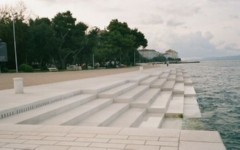
Many tourists come to listen to this musique aleatoire, and enjoy unforgettable sunset with a view to nearby islands. In 2006 the Sea Organ in Zadar, Croatia, obtained the European Prize for Urban Public Area in Barcelona.
Several masters of classical music which belong to younger generation are:
- Sasa Britvic and Mario Penzar (laureate of the 1989 Flor Peeters International Organ Competition in Mechelen, Belgium) founded in 1999 in Zagreb the Croatian Baroque Ensamble which specialized in baroque music.
- An outstanding Croatian composer is Frano Parac. I can recommend you to enjoy his music.
International Festival ORGANUM HISTRIAE UMAG
Croatian cultural society Napredak (Progress) from Sarajevo, capital of Bosnia - Herzegovina, has a nice mixed choir called Trebevic. During the 1992-95 ferocious bombing of the city of Sarajevo, they gave numerous concert in the ruined city (in conditions that are difficult to describe), as well as 30 concerts in France, including Notre Dame in Paris. Napredak also organized very successful postwar international concerts in Sarajevo, starting from 1998.
Katarina Livljanic founded a French international Dialogos Ensemble in Paris in 1996. This vocal ensemble has singers from Norway, Venezuela, Bulgaria, Sweden, France and Croatia, specialized for Middle Age music and liturgical tradition among Mediterranean cultures. Their program includes also old Croatian glagolitic singing from Istria and very archaic singing from the island of Hvar. The glagolitic chant from medieval Croatia has been performed and recorded with great musicological interest.
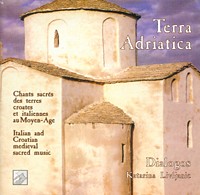
![]()
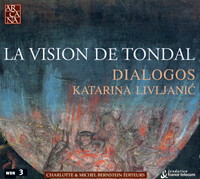
Photos from www.ensemble-dialogos.org
In 1999 a CD Terra Adriatica was issued, under the title Chants sacrés des terres croates et italiennes au Moyen-Age, Dialogos Ensemble/Katarina Livljanic, Paris, ED 13107. The ensemble has won prestigious awards of French critiques like Diapason d'or and Monde de la Musique.
Example: Puce moj [mp3], that is, Popule meus, from Poljica.
Katarina Livljanich is lecturing Middle Age music at Sorbonne in Paris. In 1998 she founded a department for interpretation of Gregorian coral at the University of Limerick, Ireland, which is one of very rare in the world. Since 2002 she is artistic adviser of the Festival of Early Music in Utrecht, the Netherlands.

![]()

- Dialogos - ensemble vocal de musique médiévale, direction: Katarina Livljanic (official web site)
- CHANTS GLAGOLITIQUES, Dialogos en concert "Terra Adriatica", chants sacrés des terres croates et italiennes au Moyen âge
- La Vision Tondale, deux concerts à Paris au Musée Nationale de Moyen-Âge, 2003, see La Vision de Tondal, Dialogos, Katarina Livljanic, CD information
Postal address: Compagnie Dialogos 137 avenue de Choisy 75013 Paris - France Tel/fax: +33. 1. 45.53.40.00 E-mail: dialogos@wanadoo.fr
Regarding the glagolitic chant in Croatia see also Following the Cross - Lenten chants from the island of Hvar, Croatia, by Nenad Bach Music Ltd., New York.
Festival of Early Music, Croatia, conceived in 2004, has been opened by Katarina Livljanic and her Dialogos ensemble, Paris, by performing La Vision Tondale in the famous Euphrasius Basilica in Porec. The organizer of the festival is Udruga Prosoli "Sveta glazba"/ Associazzione Prosoli Musica Sacra (Association Prosoli "Sacred Music"), Zagreb. Directors of the festival are Alojzije Prosoli (Croatia), Francis Biggi (Italia) i Avery Gosfield (USA). The festival is traditionally held in Istrian towns, mostly in Dvigrad, a small mediaeval town abandoned in 1630 because of the plague and malaria. One of the aims of the festival is to renew the town.
Simone Young, a famous Australian conductor, has Croatian roots on her mother's side. She was the first woman in her generation to conduct the Berlin Philharmonic; the first woman to lead the Komische Opera in Berlin, the NHK in Tokyo, the renowned all-male Vienna Philharmonic. From 2001 to 2003 she was chief conductor of Opera Australia in Sydney. She also conducted The Zagreb Philharmonic Orchestra at the Dubrovnik Summer Festival in 2000.

Simone Young, photo from The Courier Mail, Australia
...So her success, then, is 10 per cent inspiration, 90 per cent perspiration? "Yeah. Otherwise you're just not going to get there." Young's percentages are probably more even than that. The daughter of an Australian schoolteacher-turned-lawyer ("Dad's a very strong man; one day when he was already quite old he just decided to swap careers") and a Croatian-born dressmaker ("Mum struggled to learn English in the 60s; Dad took Croatian evening classes"), her earliest musical memories involve tinkering on an ancient piano at her grandmother's house, aged three. Source.
Jama Jandrokovic, American soprano married to a Croat, for her Zagreb appearance chose also three songs by Dora Pejačević (Dear Mother, My Angel ; I Believe, My Dear, and The Scream ).
Edin Dino Zonic, born and raised in Sarajevo, Bosnia and Herzegovina, is a winner of Golden Karma National Awards for 2006. He founded Unity Through Music, a nonprofit organization. As composer, conductor and cultural ambassador, Maestro Zonic is dedicated to continuing the expansion of peace and unity through music, music that bridges cultural, national and religious barriers to bring the universal message of peace.
Let us mention a young Bosnian Croat Dejan Ivanovic from the town of Tuzla (born in 1976), who took part in the prestigious International competition for classical guitar in Madrid in 1998 as a representative of Croatia, and won the first prize and the special prize.
Antonio Macan, born in 1988 in Frankfurt am Main, started to play pian at the age of four. He is now a young and very perspective pianist.
We recommend you to visit nice web pages of maestro Josip degl' Ivellio (church music), and also www.slavulj.hr.
Hrvatsko Drustvo Crkvenih Glazbenika (Croatian Society of Church Musicians)
Zvjezdice (Little Stars), all girls' choir, founded in 1985 in Zagreb, conducted by Mr. Zdravko Sljivac, became two-times world champions of the Llangollen International Music Festival of choir music (Llangollen International Musical Eisteddfod), Llangollen, Wales, UK, in 2001, and Outstanding Prize at Sligo Choral Festival in Ireland. They are often compared with the Vienna Boys Choir. Little Stars were elected as Cultural Ambassadors of the European Union Parliament. They had very successful concerts in Norway (Oslo, Stavanger), France (Paris, Nantes, Auxerre), Italy (Milano, Riva del Garda), Switzerland (Zürich), Germany (Füssen), Bosnia and Herzegovina (Sarajevo), Austria (Salzburg), USA (New York, Pittsburgh, Dayton, Northern Kentucky, Cincinatti, Pittsburgh, Cleveland, Los Angeles, Chicago), etc. You can listen to their singing of Croatian Christmas Songs. Maestro Zdravko Sljivac conducted also the World Children Choir in Paris.
Examples of Croatian Christmas carols :
- Radujte se narodi (Rejoice, peoples) [mp3]
- Svim na Zemlji mir veselje (Peace and joy to all on the Earth) [mp3]
Accordcase is
important equipment for every cellist, guitarist, hornest etc. The best,
ultralight (3-5 kg)
accordcases have been designed using carbon fibre
technology by Mr. Robert Schenk in
Pula, Croatia.
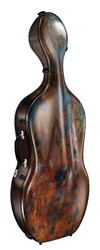 |
 |
These cases are used by many outstanding musicians, like Mstislav Rostropovic, Yo-Yo Ma, Valter Despalj, Sting, Carlos Santana, Al Di Meola, to name just a few. Many thanks to Mr. Nenad Bach for this information.
References related to Croatian music:
- F. Kuhac: Ilirski glazbenici, HSN, 1994 (reprinted from 1893 edition), with afterword of academician Lovro Zupanovic; on p. 5 Kuhac cites the following Croatian proverb: Po zveku (glazbi) se vrieme pozna, that we took as the motto of this web page.
- Stanislav Tuskar: Kratka povijest hrvatske glazbe, Matica hrvatska, Zagreb 2000.
- Lovro Zupanovic: Glazbena kultura, in [Croatia - Europe, volume II],
- Jerko Bezic: Glagoljasko pjevanje, in [Croatia - Europe, volumes I and II]
- Stefan Kocsis: Die
sakrale Musik der burgenländischen Kroaten
in Geschichte und Gegenwart - Maestro degl'Ivellio nam predstavlja, at www.croatia.ch
Croatia - overview of its History, Culture and Science
